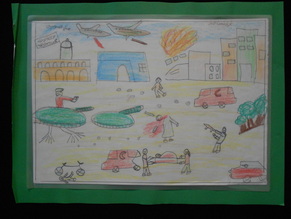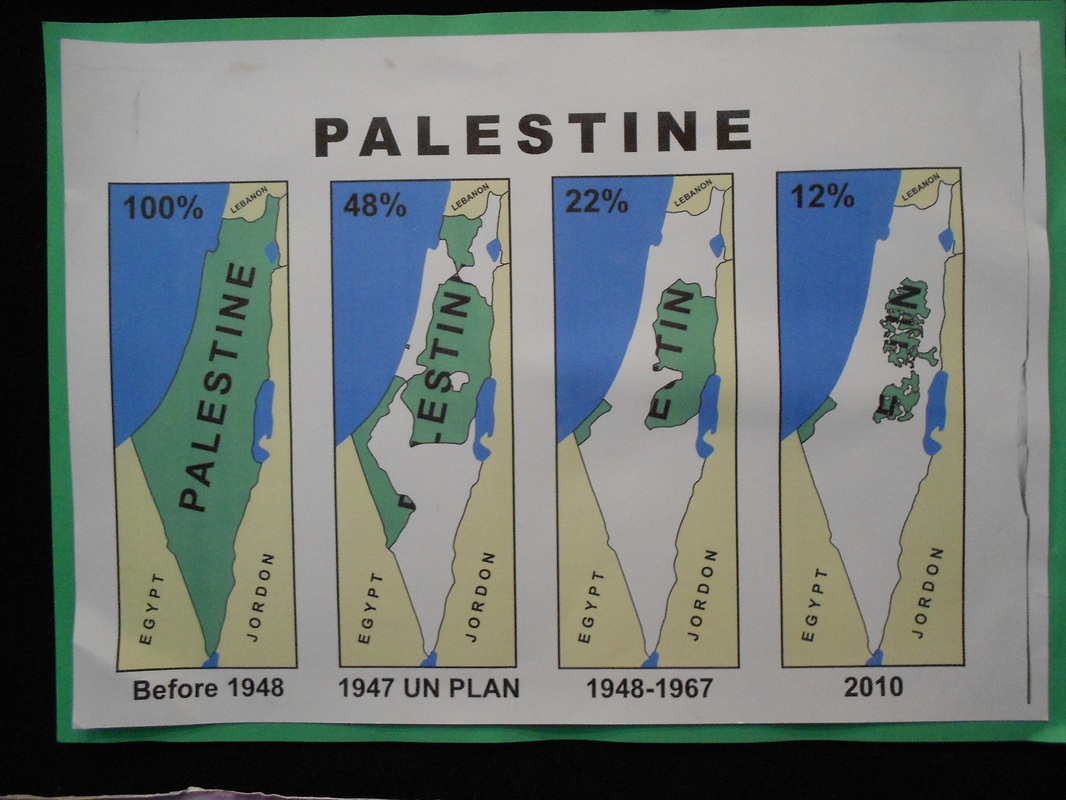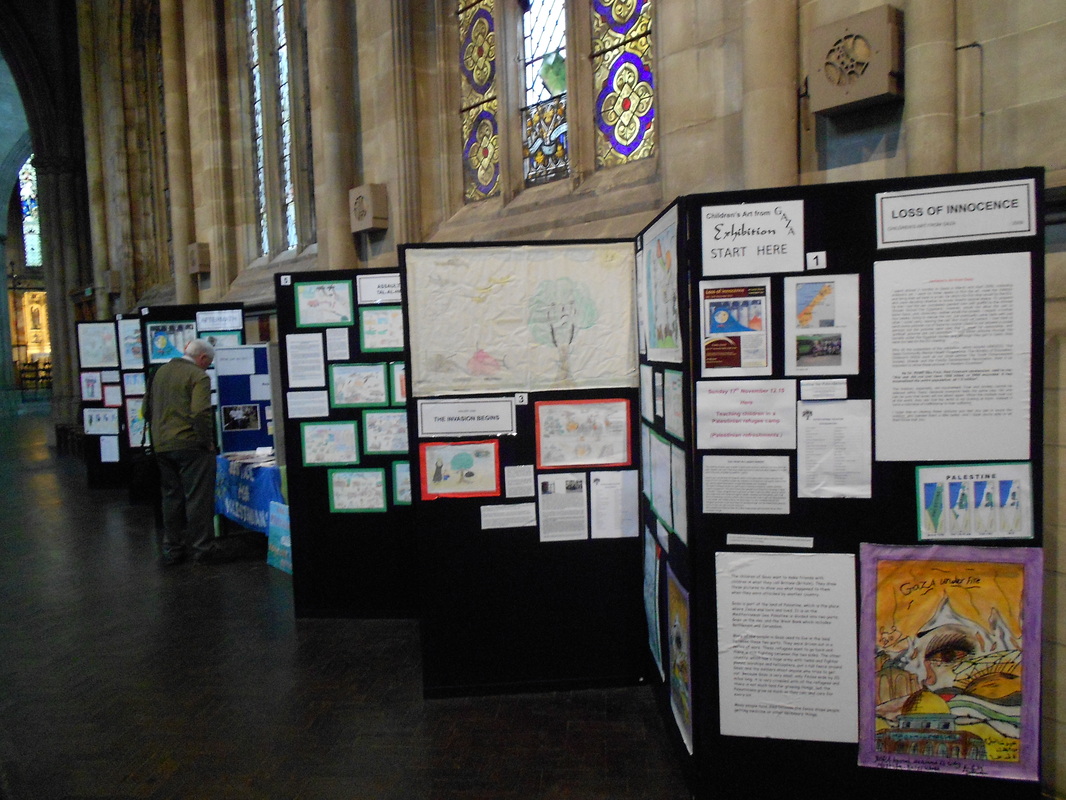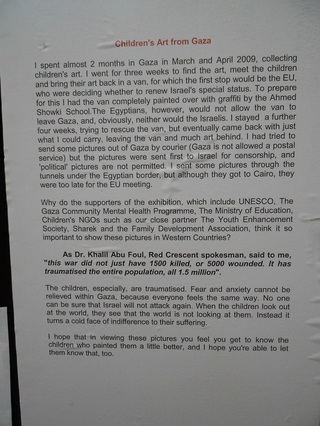
Thank you to the person who wrote to me about the Israeli/Palestinian issue. I'm sorry you didn't include either an address or a legible signature - it means I can't give you the courtesy of a personal reply. I hope you find this rather more public reflection thought-provoking instead.
Presumably your letter is in connection with the display of artwork by the children of Gaza. Have you come along to look at it? If so, you'll know that it expresses a longing for peace and hope, but it also reveals all too clearly their exposure to armed hostility, tanks, bombers, injury, destruction, and death. Would you agree that it is scandalous that the lives of these children are blighted by violence and trauma? Would you accept that for a fair hearing in this or any other situation, the voices of all parties should be heard?
You don't mention whether you have ever visited either Israel or Palestine. I have. Twice. I'm certainly not an expert, but I can speak from my limited first-hand experiences of the situation there.
I met good, decent, educated people from all three major faiths and both states.
I met Israelis who were as horrified as Palestinians that land continues to be taken from Palestinians for roads and settlements without proper consultation, agreement or redress. That was even before the days of the wall which partitions off the Palestinians living in the West Bank and the Gaza Strip, a partition which has made their quality of life (and, indeed, the survival chances for some of those seeking medical care) immeasurably worse. Have we never learned the lessons of history - that oppression and injustice eventually have devastating consequences? Do we not understand that living in mutual fear and hatred dehumanises us?
I met Palestinians (Muslim as well as Christian) who were as dismayed as Israelis at the attempts of those in their own state to resort to violence. (Admittedly there are those who hold other views, who ask whether they will ever enjoy freedom, justice and peace without an armed struggle.) Like many Palestinian people, I certainly don't condone violence, especially arbitrary violence against innocent civilians. And I worry about which views will come to the fore in the next generation, given the trauma evident in the artwork.
I met extraordinary, ordinary people working for peace, people who know that true peace will only be achieved when injustice is acknowledged and addressed, when mutual dignity, respect and rights are established, and when light is brought to bear on the various grievances and, to be frank, prejudices held on both sides.
Those prejudices are deep-rooted and all too easily spread. You use the word 'propaganda', and the reality is indeed sharply differing perspectives on history: the perspectives of the victor and of the disenfranchised. Naturally enough, given the cultural and linguistic ties and the events of history, it's the victor's account which dominates in the Western world - and the voice of the disenfranchised which focuses the grievances, real or imagined, of others. You clearly have a great deal of sympathy with the Israeli side; have you ever tried to listen to the Palestinian voice? One needs to hear both in order to arrive at a balanced understanding of the situation.
Perhaps, then, you may care to visit and listen to some of the Palestinian people still living in refugee camps, following their expulsion from the land their families had inhabited for generations? Before doing so, take a look at the map below, and reflect on it. How would you feel if it was a map, not of Palestine, but of the UK? Perhaps you might read the text in the other photo, and ask yourself why children's art should be censored. Could that reflect an unwillingness to face the truth it conveys - or to allow others to hear it? Perhaps you might like to read through the resolutions adopted by the UN Security Council (which you can access here); the Israeli/Palestinian situation has been a running sore and a matter of serious concern to the international community for over half a century. Your assertion of good neighbourliness would still ring as hollow today in Lebanon, Syria and Palestine as it would in the UN Security Council itself.
Knee-jerk reactions from either side merely inflame the situation. Of course it's unacceptable that civilians in any land, of any faith or culture, should be subject to violence and insecurity. But seeking to load the blame on one side or the other is futile. Each side feeds off the other. The violence and distrust is a cycle, which neither side alone is powerful or courageous enough to break.
The main and, I believe, the only realistic hope for a better future will come with listening, understanding, and careful negotiation. The fact that it won't be easy is well attested by the number of failed attempts over the years to broker a peace process. Despite that background, we have learned from lands such as South Africa and Northern Ireland that political progress is possible from positions of entrenched views, deep distrust and outbreaks of violence.
But until we grasp that the situation is not cut-and-dried, that there are voices to listen to other than those we've already heard, we're unlikely to make any progress. Presenting a different perspective on the issue, allowing other experiences to be shared, is a constructive and necessary contribution to the debate. I for one am glad that we are able to help in some small way by hosting this exhibition. If you have not already done so, I hope you will come along and see it, reflect on it, and use it to broaden both your outlook and your prayers.
Fr Christopher
Presumably your letter is in connection with the display of artwork by the children of Gaza. Have you come along to look at it? If so, you'll know that it expresses a longing for peace and hope, but it also reveals all too clearly their exposure to armed hostility, tanks, bombers, injury, destruction, and death. Would you agree that it is scandalous that the lives of these children are blighted by violence and trauma? Would you accept that for a fair hearing in this or any other situation, the voices of all parties should be heard?
You don't mention whether you have ever visited either Israel or Palestine. I have. Twice. I'm certainly not an expert, but I can speak from my limited first-hand experiences of the situation there.
I met good, decent, educated people from all three major faiths and both states.
I met Israelis who were as horrified as Palestinians that land continues to be taken from Palestinians for roads and settlements without proper consultation, agreement or redress. That was even before the days of the wall which partitions off the Palestinians living in the West Bank and the Gaza Strip, a partition which has made their quality of life (and, indeed, the survival chances for some of those seeking medical care) immeasurably worse. Have we never learned the lessons of history - that oppression and injustice eventually have devastating consequences? Do we not understand that living in mutual fear and hatred dehumanises us?
I met Palestinians (Muslim as well as Christian) who were as dismayed as Israelis at the attempts of those in their own state to resort to violence. (Admittedly there are those who hold other views, who ask whether they will ever enjoy freedom, justice and peace without an armed struggle.) Like many Palestinian people, I certainly don't condone violence, especially arbitrary violence against innocent civilians. And I worry about which views will come to the fore in the next generation, given the trauma evident in the artwork.
I met extraordinary, ordinary people working for peace, people who know that true peace will only be achieved when injustice is acknowledged and addressed, when mutual dignity, respect and rights are established, and when light is brought to bear on the various grievances and, to be frank, prejudices held on both sides.
Those prejudices are deep-rooted and all too easily spread. You use the word 'propaganda', and the reality is indeed sharply differing perspectives on history: the perspectives of the victor and of the disenfranchised. Naturally enough, given the cultural and linguistic ties and the events of history, it's the victor's account which dominates in the Western world - and the voice of the disenfranchised which focuses the grievances, real or imagined, of others. You clearly have a great deal of sympathy with the Israeli side; have you ever tried to listen to the Palestinian voice? One needs to hear both in order to arrive at a balanced understanding of the situation.
Perhaps, then, you may care to visit and listen to some of the Palestinian people still living in refugee camps, following their expulsion from the land their families had inhabited for generations? Before doing so, take a look at the map below, and reflect on it. How would you feel if it was a map, not of Palestine, but of the UK? Perhaps you might read the text in the other photo, and ask yourself why children's art should be censored. Could that reflect an unwillingness to face the truth it conveys - or to allow others to hear it? Perhaps you might like to read through the resolutions adopted by the UN Security Council (which you can access here); the Israeli/Palestinian situation has been a running sore and a matter of serious concern to the international community for over half a century. Your assertion of good neighbourliness would still ring as hollow today in Lebanon, Syria and Palestine as it would in the UN Security Council itself.
Knee-jerk reactions from either side merely inflame the situation. Of course it's unacceptable that civilians in any land, of any faith or culture, should be subject to violence and insecurity. But seeking to load the blame on one side or the other is futile. Each side feeds off the other. The violence and distrust is a cycle, which neither side alone is powerful or courageous enough to break.
The main and, I believe, the only realistic hope for a better future will come with listening, understanding, and careful negotiation. The fact that it won't be easy is well attested by the number of failed attempts over the years to broker a peace process. Despite that background, we have learned from lands such as South Africa and Northern Ireland that political progress is possible from positions of entrenched views, deep distrust and outbreaks of violence.
But until we grasp that the situation is not cut-and-dried, that there are voices to listen to other than those we've already heard, we're unlikely to make any progress. Presenting a different perspective on the issue, allowing other experiences to be shared, is a constructive and necessary contribution to the debate. I for one am glad that we are able to help in some small way by hosting this exhibition. If you have not already done so, I hope you will come along and see it, reflect on it, and use it to broaden both your outlook and your prayers.
Fr Christopher



 RSS Feed
RSS Feed